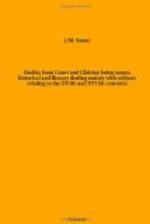* In her Giordano Bruno, p. 5. London, 1877.
Having arrived thus far, the panegyrist breaks out into eulogy of “the grandest hero of free-thought,” and claims for Bruno the proud distinction of materialist.
Others of his admirers, and notably his English biographer, Frith, declare that the aim of the Nolan philosophy is to overcome the fear of death, and to fill the soul with noble aspirations, while they maintain that its author forestalled Darwin and Herbert Spencer in their theory of evolution. “Nobody is to-day the same as yesterday. All things, even the smallest, have their share in the universal intelligence, or universal thinking power. For without a certain degree of sense or cognition, the drop of water could not assume the spherical shape which is essential to the preservation of its forces. All things participate in the universal intelligence, and hence come attraction and repulsion, love and hate. Nature shows forth each species before it enters into life. Thus each species is the starting-point for the next.” These are some of the ideas, the conception of which is supposed to shadow forth Bruno’s anticipation of modern thought.
Landseck, his principal German biographer, makes him the link between antiquity and the celebrated thinkers of the nineteenth century. He considers the doctrine of the indestructibility of the monad to be that belief in the immortality of the soul which was professed by the Druids, the Egyptians, the Brahmins, and the Buddhists, the belief of Pythagoras and Plato, of Plotinus, of Lessing, and of Goethe, in unison with the evolution of Darwin and Haeckel.*
* Landseck, Bruno der Martyrer der neuen Weltanschauung, p. 37.
It is not our purpose to consider here all Bruno’s articles of faith or unfaith, but rather to show the general tendency of his teaching, in order to trace its effect upon his contemporaries in England. His philosophy, itself a travesty of various systems, was in its turn caricatured and vulgarised in a manner which would, perhaps, had he lived to see it, have gone far to persuade him of the risk to popular order and morality which he incurred, in taking from people their belief in a personal God, and fear of the consequences of sin.
Some years ago a statue was raised to his honour on the Campo dei Fiori in Rome, on the alleged spot of his execution, as a vindication of those principles for which he chose to die. In his own day they were held to be dangerous to the State, and subversive of public morality, and he was forced to fly before the opposition they aroused from almost every place in which he attempted to propagate them. The enmity of the Calvinists drove him from Geneva; at Toulouse the Huguenots made his life unbearable; the Oxford of Elizabeth, as intolerant as Rome, proved no agreeable sojourn, but he left traces of his passage through England, which Elizabeth, however much she favoured him at the time of his visit, was afterwards at great pains to efface.




